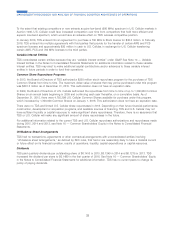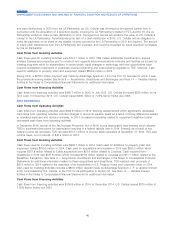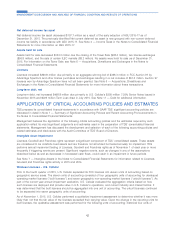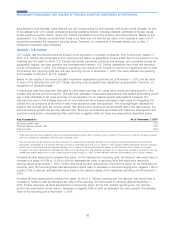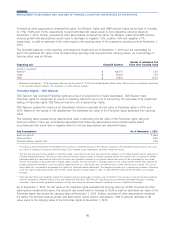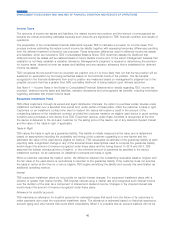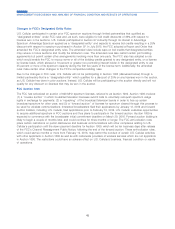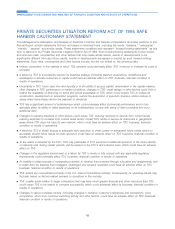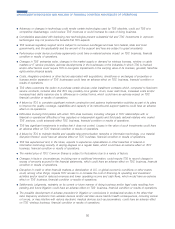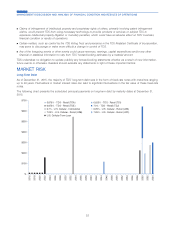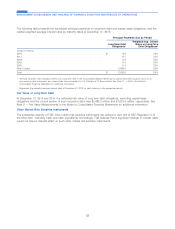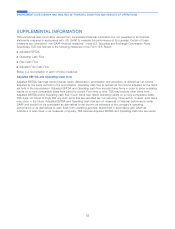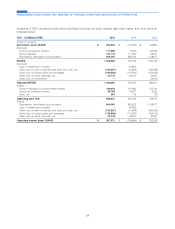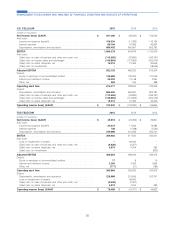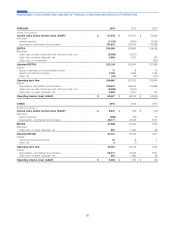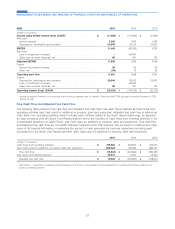US Cellular 2015 Annual Report Download - page 55
Download and view the complete annual report
Please find page 55 of the 2015 US Cellular annual report below. You can navigate through the pages in the report by either clicking on the pages listed below, or by using the keyword search tool below to find specific information within the annual report.
collected, the account balance is charged against the allowance for doubtful accounts. To the extent that actual loss
experience differs significantly from historical trends, the required allowance amounts could differ from the original
estimates.
OTHER ITEMS
Inflation
Management believes that inflation affects TDS’ business to no greater or lesser extent than the general economy.
Seasonality
U.S. Cellular’s profitability historically has been lower in the fourth quarter as a result of significant marketing and
promotional activity during the holiday season.
Recently Issued Accounting Pronouncements
See Note 1 — Summary of Significant Accounting Policies and Recent Accounting Pronouncements in the Notes to
Consolidated Financial Statements for information on recently issued accounting pronouncements.
Certain Relationships and Related Transactions
See Note 20 — Certain Relationships and Related Transactions in the Notes to Consolidated Financial Statements.
REGULATORY MATTERS
FCC Net Neutrality Order
In February 2015, the FCC adopted an Open Internet Order relating to new net neutrality rules. The rules became
effective in June 2015. The order reclassified high-speed, or broadband, internet access service as a
‘‘telecommunication service,’’ making it subject to common carrier regulation under Title II of the Communications Act of
1934. The order applies equally to fixed and wireless broadband internet service providers and thus applies to internet
broadband services provided by telephone, cable and wireless providers.
The rules prohibit (i) blocking (broadband providers may not block access to legal content, applications, services, or
non-harmful devices); (ii) throttling (broadband providers may not impair or degrade lawful Internet traffic on the basis of
content, applications, services, or non-harmful devices); and (iii) paid prioritization (broadband providers may not favor
some lawful internet traffic over other lawful traffic in exchange for consideration, i.e., internet ‘‘fast lanes’’ are prohibited).
Also, internet service providers may not prioritize content and services of their affiliates. In addition, the FCC has now
asserted jurisdiction over internet traffic exchange, so interconnection arrangements will now be subject to a statutory
requirement that all charges, practices, classifications, and regulations for and related to interconnection must be just
and reasonable. The rules also include a general conduct standard that will be applied on a case-by-case basis to
address questionable practices as they occur that unreasonably interfere with or unreasonably disadvantage lawful
content, applications, services, or devices to be used by end users (individuals or entities that use a broadband internet
access service), or made available by edge providers (individuals or entities that provide any content, application, or
service over the internet, and any individual or entity that provides a device used for accessing any content, application,
or service over the internet). Although broadband internet access providers will be allowed to engage in reasonable
network management practices, it is uncertain what practices will be permitted by the FCC. The order also expands the
FCC’s current internet transparency rules.
All of these requirements will be subject to FCC enforcement and potential third-party claims for damages or equitable
relief. Under Title II, the FCC will have broad regulatory authority over internet services and internet service providers.
Although the FCC indicated that it will forbear from a number of utility-style regulations, such as rate regulation, tariffs,
and unbundling requirements, the FCC could decide to apply such regulations and requirements in the future. Also, it is
uncertain if internet services may be subject to the Federal USF contributions or taxation in the future as a result of the
reclassification under Title II. Lawsuits have been filed challenging the net neutrality rules and the FCC’s decision to
reclassify broadband internet access service under Title II. TDS cannot predict the outcome of these proceedings or the
impact on its business.
47
MANAGEMENT’S DISCUSSION AND ANALYSIS OF FINANCIAL CONDITION AND RESULTS OF OPERATIONS



